 ★★★
★★★
“Somewhat Expendable…”
Credit to The Asylum for getting off their ass and actually making a female version of The Expendables, while every other producer to touch the idea, has so far been nothing but talk. Certainly, it’s a cast to die for, with some of the most renowned action heroine names from both the past (Cynthia Rothrock, albeit kicking less butt than I’d like – but hell, she’s 57 – and with a hairstyle which has to be seen to be believed) and present (Zoë Bell, whom we will watch in absolutely anything. And occasionally have). The rest of the cast is an interesting mix of has-beens (Brigitte Nielsen) and names you’ll recognize from other genre entries (Kristanna Loken, Vivica A. Fox). It’s not a bad cast, though one wished, instead of Nicole Bilderback, they’d got someone like Rina Takeda or Yanin Mitananda. On the other hand, having an Asian that’s not good at martial arts is about as close as this gets to going counter to stereotype.
4 mercenaries. 1 President’s daughter. 1 crazyass bitch. 6 badasses. @TheRealZoeBell @LokenKristanna pic.twitter.com/EEO9B8Apx5— Nikki Bilderback (@LadyBilderback) March 17, 2014
The scenario is basic but serves its purpose. The President’s daughter is kidnapped while on a trip to Kazakhstan by local warlord Ulrika (Nielsen). Her hatred of men leaves the best rescue solution to send in a team of women, hand-picked by CIA section chief or something Mona (Rothrock) from various prisons. There’s disgraced agent Raven (Fox), sharpshooter Kat (Loken), explosives expert Mei-Lin (Bilderback) and all-round bad-ass Clay (Bell), who is given the task of leading the group into the remote corner of Asia, infiltrating Ulrika’s lair and rescuing the “First Daughter”. They do so by faking Mei-Lin’s identity, claiming she’s the daughter of a rich industrialist, whom they’ve kidnapped, and offering her to Ulrika for the ransom possibilities. Of course, getting in is one thing: finding the President’s offspring, setting her loose, and then everyone escaping from the middle of nowhere back to the good old US of A is quite another.
Directed by Christopher Olen Ray, son of noted B-movie maestro Fred Olen Ray, easily the best thing about this are the characters. Nielsen may not have aged well, to put it mildly, but she’s still six foot tall, and looks like she could spit nails into floorboards. On the side of good, Bell and Fox, in particular, also capture the necessary spirit of marginally-restrained irritability, with Loken and Bilderback providing a little lightness for contrast. The banter between them is a bit of a mixed bag: I mean, “fucking George Clooney with a strap-on” sounds more like bizarre wish-fulfillment from writer Edward DeRuiter than anything a real woman might say. However, other moments do have a nice sense of authenticity, and you get the sense that each of the main characters have enough back-story to fuel an entire feature on their own. That’s in part because most of the actresses already are more than familiar to anyone with even a passing interest in action heroines. Even Bilderback, the least-known, was in the unaired pilot for Buffy the Vampire Slayer, so has at least a minor role in the history of our genre. It might have been fun if the script had played off their history more, riffing on Loken’s part in Terminator 3 in some way, or Fox’s in Kill Bill. After all, that’s why they’re all here, and I can’t think of a more loaded cast in GWG film history.
Unfortunately, what doesn’t work is the action. The most obvious problem is an excess of mediocre digital effects, particularly in the areas of muzzle flashes and blood. Few things work so well at taking the audience out of the moment, as when you start spotting things like that: generally, you are better off not having muzzle flashes at all, than doing them badly. But a much more egregious crime by Olen Ray is having a crown jewel like Zoë Bell, but taking her action scenes and running them through a cinematic wood-chipper. You need to do this kind of thing when you have an actress who can’t do her own action, and you need to hide a stunt double or to make them look better than they are. You do not need to do either when you have Bell: you stand back, point the camera in her direction – and might as well get some popcorn, since you’ll be there a while. What you get here instead, is like hiring Maria Callas, then having her lip-sync, and it’s aggravating as hell, with only a few flashes of the talent we know to be present. Compare and contrast the approach of Raze, which largely just got out of Bell’s way.
It’s a shame, because the film did so much right, from intent through to assembling a rock-solid cast, yet couldn’t finish off the process. The Asylum are notorious for their mockbusters e.g. Atlantic Rim, but this has enough fresh about it that it could have been one of the best films in their catalog (and, I should know because, dammit, I’ve seen far more of them than most people!). Hopefully, it’s still successful enough to merit a sequel, perhaps under someone with a better handle on shooting the action.
Dir: Christopher Douglas Olen Ray
Star: Zoë Bell, Brigitte Nielsen, Kristanna Loken, Vivica A. Fox





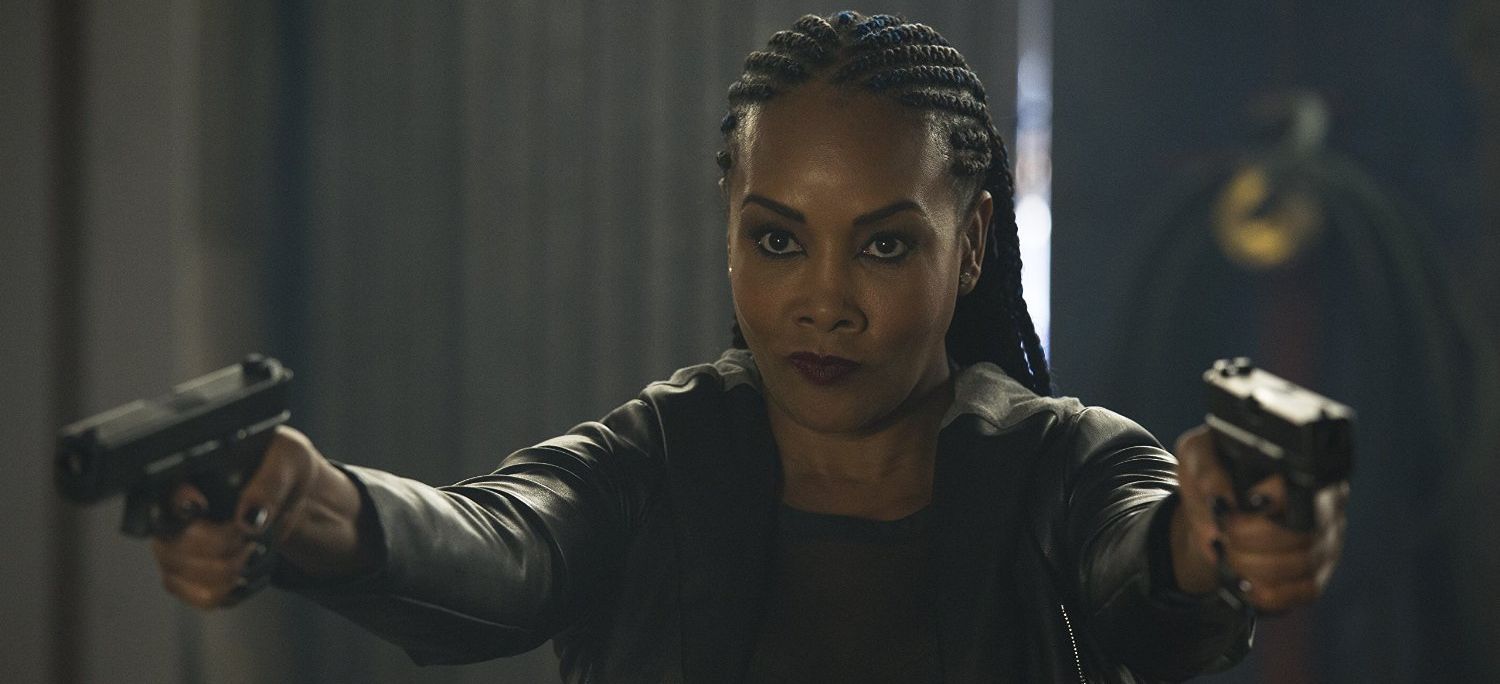
 It’s 1993, and the peace process in Northern Ireland is cautiously inching forward – though there are some who prefer a more robust method of rebellion, shall we say. Among them is Collette McVeigh (Riseborough) whose little brother was killed by the British Army when she was 12. Along with her brothers Gerry (Gillen, whom you’ll know as Littlefinger from Game of Thrones) and Connor, she is part of the armed struggle, until a mission to plant a bomb in London leads to her capture. MI5 officer Mac (Owen) gives her a stark choice: face a long stretch in prison, separated from her children, or become an informer on her own family. Collette chooses the later, perhaps influenced by Mac showing her it was an IRA sniper who killed her brother. But it soon becomes clear more is at play, with Mac’s boss (Anderson) apparently intent on sacrificing Collette, in order to protect another, more valuable asset.
It’s 1993, and the peace process in Northern Ireland is cautiously inching forward – though there are some who prefer a more robust method of rebellion, shall we say. Among them is Collette McVeigh (Riseborough) whose little brother was killed by the British Army when she was 12. Along with her brothers Gerry (Gillen, whom you’ll know as Littlefinger from Game of Thrones) and Connor, she is part of the armed struggle, until a mission to plant a bomb in London leads to her capture. MI5 officer Mac (Owen) gives her a stark choice: face a long stretch in prison, separated from her children, or become an informer on her own family. Collette chooses the later, perhaps influenced by Mac showing her it was an IRA sniper who killed her brother. But it soon becomes clear more is at play, with Mac’s boss (Anderson) apparently intent on sacrificing Collette, in order to protect another, more valuable asset.
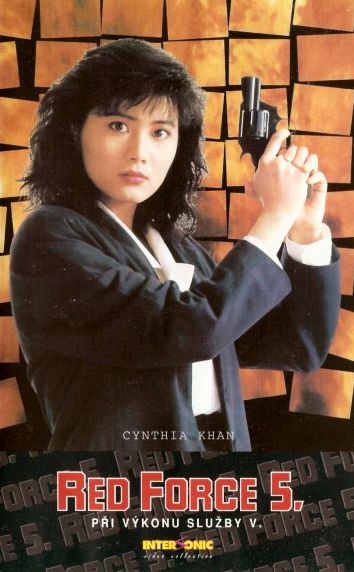 After the magnificence of Donnie Yen and Khan in its insane predecessor, the fifth installment was always going to have a tough job living up to the same standard. On its own terms, it’s perfectly reasonable, but certainly suffers in the comparison, not least because the storyline is strikingly similar. Once again, there’s an innocent who gets caught up in murky dealings between Inspector Yang Lei-Ching (Khan) and the CIA, and finds themselves on the run from a pack of assassins, unsure who to trust – except Yang, of course. In this case, it’s her cousin, David (Wu), a marine who has returned to Hong Kong, only to find himself under suspicion for espionage. In particular, being part of a Korean group, led by a man known only as ‘The General’ (Chow), who deals in Western secrets. It’s up to David and Lei-Ching to prove otherwise – if they can stay alive long enough to do it.
After the magnificence of Donnie Yen and Khan in its insane predecessor, the fifth installment was always going to have a tough job living up to the same standard. On its own terms, it’s perfectly reasonable, but certainly suffers in the comparison, not least because the storyline is strikingly similar. Once again, there’s an innocent who gets caught up in murky dealings between Inspector Yang Lei-Ching (Khan) and the CIA, and finds themselves on the run from a pack of assassins, unsure who to trust – except Yang, of course. In this case, it’s her cousin, David (Wu), a marine who has returned to Hong Kong, only to find himself under suspicion for espionage. In particular, being part of a Korean group, led by a man known only as ‘The General’ (Chow), who deals in Western secrets. It’s up to David and Lei-Ching to prove otherwise – if they can stay alive long enough to do it.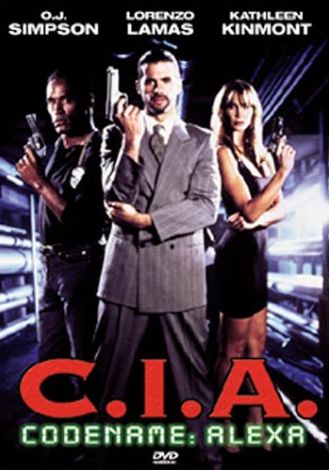

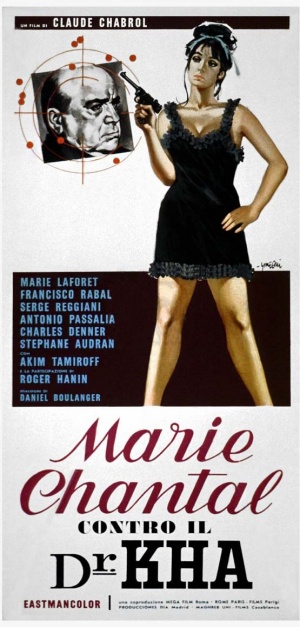 I’d probably better start of by explaining the above tagline, Chabrol was one of the leading lights of the French ‘New Wave’ cinema, alongside the likes of Truffaut and Godard: I’ve enjoyed the films of his I’ve seen, mostly later works such as L’Enfer or La Fille coupée en deux. But in the mid-60’s, he basically sold out, churning out a number of light spy spoofs. Regarding another of his works around this time, he said, “I really wanted to get the full extent of the drivel. They were drivel, so OK, lets get into it up to our necks.” It’s easy to see what he meant, for Marie-Chantal is undeniable drivel, though lacks the necessary enthusiasm to overcome those limitations. Through a chance encounter on a train, the titular heroine (Laforet) is given a piece of jewellery by a stranger. That makes her the target for spies from Russia and America, as she travels from the Alps to Morocco, and also the minions of evil overlord Dr. Kha (Tamiroff), for it holds the secret to a weapon of potential global destruction, that everyone wants to acquire.
I’d probably better start of by explaining the above tagline, Chabrol was one of the leading lights of the French ‘New Wave’ cinema, alongside the likes of Truffaut and Godard: I’ve enjoyed the films of his I’ve seen, mostly later works such as L’Enfer or La Fille coupée en deux. But in the mid-60’s, he basically sold out, churning out a number of light spy spoofs. Regarding another of his works around this time, he said, “I really wanted to get the full extent of the drivel. They were drivel, so OK, lets get into it up to our necks.” It’s easy to see what he meant, for Marie-Chantal is undeniable drivel, though lacks the necessary enthusiasm to overcome those limitations. Through a chance encounter on a train, the titular heroine (Laforet) is given a piece of jewellery by a stranger. That makes her the target for spies from Russia and America, as she travels from the Alps to Morocco, and also the minions of evil overlord Dr. Kha (Tamiroff), for it holds the secret to a weapon of potential global destruction, that everyone wants to acquire.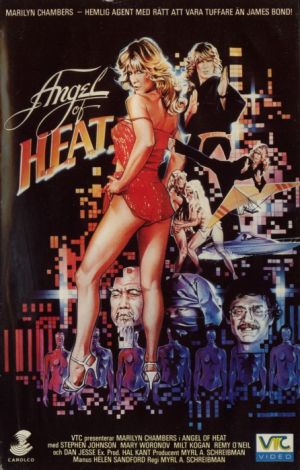 After some hi-tech computer chips go missing, government agents Samantha (Woronov) and Mark (Johnson) are assigned to go undercover at the electronics plant. But also investigating is Angel Harmony (porn star Chambers), with whom Samatha has crossed swords before, and #1 agent one of a group called The Protectors, “international vigilantes, outlaws in the service of peace and freedom” as the introductory title card calls them. Eventually teaming up, they discover the missing chips were only the tip of an iceberg created by a thoroughly-mad scientist (Jesse), who is planning to use high-pitched sound and his army of androids (which have, charitably, been given sex drives!) to take over the world and… Oh, y’know: the usual mad scientist stuff, I guess.
After some hi-tech computer chips go missing, government agents Samantha (Woronov) and Mark (Johnson) are assigned to go undercover at the electronics plant. But also investigating is Angel Harmony (porn star Chambers), with whom Samatha has crossed swords before, and #1 agent one of a group called The Protectors, “international vigilantes, outlaws in the service of peace and freedom” as the introductory title card calls them. Eventually teaming up, they discover the missing chips were only the tip of an iceberg created by a thoroughly-mad scientist (Jesse), who is planning to use high-pitched sound and his army of androids (which have, charitably, been given sex drives!) to take over the world and… Oh, y’know: the usual mad scientist stuff, I guess.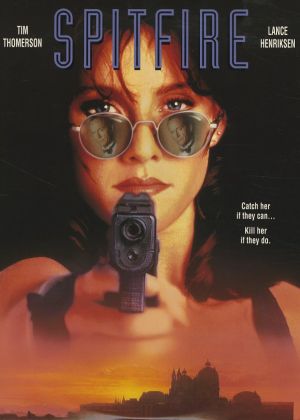 This can only be described as a mess, albeit a crappily entertaining one, with a leading lady in Phillips, who almost made it to the Olympics, being described as “the next Mary-Lou (Retton)”, before trying her hand in low-budget action. She plays an international-level gymnast and martial-arts expert, whose parents are, unknown to her, involved in a plot involving the launch codes for Ukrainian missiles. The mother is killed by villainous Brit, Carla Davis (Douglas – apparently Jenny Agutter was unavailable. Or, more likely, too expensive), who wants to get her claws on the codes for some reason. Hey, she’s a villain: what more does she need? She captures Dad (Henriksen), but not before he has given his daugher the first in a series of clues which will lead her and investigative journalist Rex Beechum (Thomerson), apparently with an unlimited expense account, around the globe from Rome to Kuala Lumpur to Hong Kong and Athens, bumping into various unexpected siblings along the way.
This can only be described as a mess, albeit a crappily entertaining one, with a leading lady in Phillips, who almost made it to the Olympics, being described as “the next Mary-Lou (Retton)”, before trying her hand in low-budget action. She plays an international-level gymnast and martial-arts expert, whose parents are, unknown to her, involved in a plot involving the launch codes for Ukrainian missiles. The mother is killed by villainous Brit, Carla Davis (Douglas – apparently Jenny Agutter was unavailable. Or, more likely, too expensive), who wants to get her claws on the codes for some reason. Hey, she’s a villain: what more does she need? She captures Dad (Henriksen), but not before he has given his daugher the first in a series of clues which will lead her and investigative journalist Rex Beechum (Thomerson), apparently with an unlimited expense account, around the globe from Rome to Kuala Lumpur to Hong Kong and Athens, bumping into various unexpected siblings along the way. Having been largely unimpressed by Iguchi’s other work, which seemed to have little to offer except megabytes of digital blood, I likely wouldn’t have watched this except an accident involving beer and my Apple TV remote has stopped me from much of my usual viewing. I could still stream from Netflix, however, though when I saw this was dubbed in English, I almost didn’t bother. But surprisingly, this has easily the best plot of his movies, with a slyly-twisted sense of imagination that’s very effective.
Having been largely unimpressed by Iguchi’s other work, which seemed to have little to offer except megabytes of digital blood, I likely wouldn’t have watched this except an accident involving beer and my Apple TV remote has stopped me from much of my usual viewing. I could still stream from Netflix, however, though when I saw this was dubbed in English, I almost didn’t bother. But surprisingly, this has easily the best plot of his movies, with a slyly-twisted sense of imagination that’s very effective.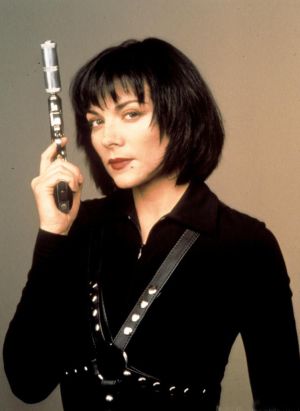 Agent Delilah (Cattrall) is undercover investigating arms dealer Alec Kasharian (Voyagis), and his connection to Palestinian terrorists [this was 1993, when people were concerned about such things]. At the behest of her handler Paul (Zane), she copies a floppy-disk containing vital information [I repeat, this was 1993, when an entire arms dealer’s business would apparently fit on a floppy!], but she’s discovered, shot multiple times, and left for dead. Paul drags her Swiss cheese-like body back to a secret government lab, where she is repaired, upgraded and generally enhanced in terms of speed, power and other abilities.
Agent Delilah (Cattrall) is undercover investigating arms dealer Alec Kasharian (Voyagis), and his connection to Palestinian terrorists [this was 1993, when people were concerned about such things]. At the behest of her handler Paul (Zane), she copies a floppy-disk containing vital information [I repeat, this was 1993, when an entire arms dealer’s business would apparently fit on a floppy!], but she’s discovered, shot multiple times, and left for dead. Paul drags her Swiss cheese-like body back to a secret government lab, where she is repaired, upgraded and generally enhanced in terms of speed, power and other abilities.